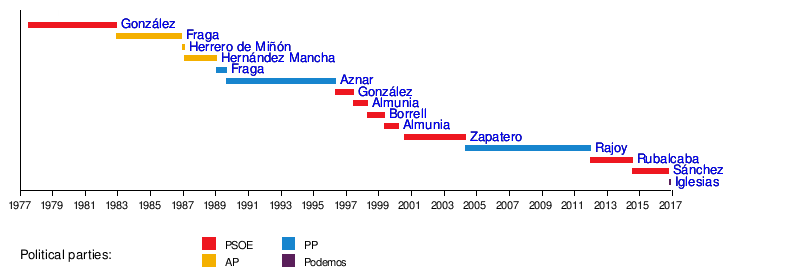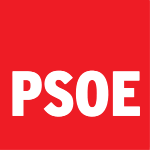Leader of the Opposition (Spain)
| Leader of the Opposition
Líder de la oposición | |
|---|---|
|
Logos of the political parties disputing the title | |
| Residence | No official residence |
| Appointer | None |
| Term length |
No fixed term While leader of the largest political party not in government |
| Inaugural holder | Felipe González |
| Formation | 13 July 1977 |
The Leader of the Opposition (Spanish: Líder de la oposición) is an unofficial, mostly conventional and honorary title traditionally held by the leader of the largest party in the Congress of Deputies—the lower house of the Spanish parliament, the Cortes Generales—not within the government. He/she is usually the person who is expected to lead that party into the next general election.
The last undisputed Leader of the Opposition was Pedro Sánchez, who served until resigning from the role on 1 October 2016.
Role
There is some ambiguity on the requirements needed to hold the post due to its workings being based mostly on custom and convention. The term of "Leader of the Opposition" is only legally recognized in a Royal Decree passed in 1983 establishing the order of preference of public authorities in general official acts organized by the Crown, Government or the State Administration, acknowledging the figure of Opposition Leader but only to put it in fifteenth place in the list of precedences.[1]
By agreement of the Congress bureau of 28 December 1982, Manuel Fraga was officially recognized as Leader of the Opposition by the PSOE government of Felipe González—himself having unofficially led opposition from 1977 to 1982.[2] Such an agreement established a series of conditions for the role and awarded some prerogatives for the officeholder:
- Determination of the person fulfilling the role of leader of the opposition must meet criteria of effective parliamentary number preeminence
- There must not be a formal appointment
- There is no need to raise compatibility issues for the role
- Must lack a full-blown salary, even if it may have a right to representation expenses, vehicle availability as well as the care provided for bureau members
However, despite the possibility for some privileges in consideration of its position being optionally awarded, the Leader of the Opposition is not entitled to a specific salary aside from the one they may have by reason of holding a public office on their own—such as that of deputy or senator. In addition, the officeholder usually receives much more attention from the media in parliamentary sessions and activities, such as in the yearly-held State of the Nation Debate.[3]
Even with the absence of a law defining the role of the Opposition Leader, it is customary to conduct update meetings between the Prime Minister and the chairman of the largest party not within the government. However, such meetings are carried out mostly according to the Prime Minister's decision. Established precedent has also led for the Leader of the Opposition usually sitting directly across from the Prime Minister in the Congress seating plan. It is not required for a Leader of the Opposition to held the post of deputy in Congress—Antonio Hernández Mancha held the office without having a seat in Congress,[4] though he was a senator.
History
On 1986, Manuel Fraga resigned as People's Alliance chairman and was replaced in the interim by Miguel Herrero de Miñón. While Herrero de Miñón served as interim AP leader until a party congress was held in February 1987, he was acknowledged as Opposition Leader on his own right, the only such case for a interim party leader ever since.[5][6][7]
In 1998, with the People's Party in government, Josep Borrell beat PSOE Secretary General Joaquín Almunia in a party primary to elect the party's candidate to Prime Minister in the subsequent general election.[8] Almunia maintained his post as party leader whereas Borrell was named the party's spokesperson in Congress and was awarded leadership over the parliamentary party, with the later being officially referred to as the leader of the opposition.[9][10] However, both Almunia and Borrell kept clashing on leadership issues for months—in a situation referred to as 'bicephaly'[11][12]—until an agreement between the two parts definitely recognized Borrell the condition of opposition leader in November 1998.[13] He would eventually resign as candidate on May 1999, awarding Almunia the sole and undisputed leadership over the party and opposition.[14]
The office came again under dispute in 2016, days after a caretaker committee under Javier Fernández had taken control over PSOE as a result of a leadership crisis in October. Pablo Iglesias of Podemos subsequently self-proclaimed himself as new opposition leader on the basis of his party's strength in Congress being close to PSOE's—67 seats to 84.[15][16] During Mariano Rajoy's second investiture debate on 27 October, Spanish media and parliamentarians acknowledged Iglesias the role of Opposition Leader by virtue of Rajoy addressing him as his main rival during a heated dialectical exchange,[17][18][19] coupled with PSOE's perceived inability to exercise as opposition after choosing to allow Rajoy's election.[20][21]
List of Opposition leaders
Overall leaders names are bolded. Interim or disputed leaders are in italics.
| Colour key (for political parties) |
|---|
| Portrait | Name (Birth–Death) |
Term of office | Political Party | Main Opposition Group | Legislature | Prime Minister (Term) | ||||
|---|---|---|---|---|---|---|---|---|---|---|
| Took office | Left office | Days | ||||||||
.jpg) |
Felipe González (b. 1942) |
13 July 1977 | 2 April 1979 | 676 | Spanish Socialist Workers' Party | PSOE | Constituent (1977) | Suárez (1976–81) | ||
| 2 April 1979 | 20 May 1979 | PSOE | I (1979) | |||||||
| First time. Spanish transition to democracy. 1978 Moncloa Pact. Spanish Constitution of 1978 adopted. PSOE's refusal to reject marxism leading to his resignation. | ||||||||||
| Position vacant | 20 May 1979 | 28 September 1979 | 131 | —— | PSOE | I (——) | ||||
| After González's resignation, José Federico de Carvajal presided over a Caretaker Committee that led PSOE in the interim from 21 May to 28 September 1979. | ||||||||||
.jpg) |
Felipe González (b. 1942) |
28 September 1979 | 2 December 1982 | 1161 | Spanish Socialist Workers' Party | PSOE | I (——) | |||
| Calvo-Sotelo (1981–82) | ||||||||||
| Second time. Re-elected after PSOE's rejection of marxism. 1980 unsuccessful censure motion on Suárez. 1981 failed coup d'état (23-F). Opposition to Spain's entry into NATO. | ||||||||||
.jpg) |
Manuel Fraga (1922–2012) |
2 December 1982 | 24 July 1986 | 1460 | People's Alliance | AP–PDP–PL | II (1982) | González (1982–96) | ||
| 24 July 1986 | 1 December 1986 | AP–PL | III (1986) | |||||||
| First time. CP establishment. Support of Spain EEC membership. Party performance in 1986 Basque regional election leading to his resignation. | ||||||||||
| Position vacant | 1 December 1986 | 23 December 1986 | 22 | —— | AP–PL | III (——) | ||||
| After Fraga's resignation, Miguel Herrero de Miñón served as AP interim leader from 6 December 1986 in his condition as party executive vice president. | ||||||||||
 |
Miguel Herrero de Miñón (b. 1940) |
23 December 1986 | 8 February 1987 | 47 | People's Alliance | AP–PL | III (——) | |||
| Chosen to led AP parliamentary party on 9 December, acknowledged as Opposition Leader from 23 December and until his defeat to Antonio Hernández Mancha in the 1987 AP congress. CP break up. | ||||||||||
 |
Antonio Hernández Mancha (b. 1951) |
8 February 1987 | 20 January 1989 | 712 | People's Alliance | AP | III (——) | |||
| 1987 unsuccessful censure motion on González. Renounced to contest 1989 AP congress. | ||||||||||
.jpg) |
Manuel Fraga (1922–2012) |
20 January 1989 | 4 September 1989 | 227 | People's Party | PP | III (——) | |||
| Second time. PP establishment. Announced he would not contest a new general election after re-election as party leader, serving as interim Opposition Leader until Aznar's appointment. | ||||||||||
.jpg) |
José María Aznar (b. 1953) |
4 September 1989 | 6 December 1989 | 2435 | People's Party | PP | III (——) | |||
| 6 December 1989 | 10 July 1993 | PP | IV (1989) | |||||||
| 10 July 1993 | 5 May 1996 | PP | V (1993) | |||||||
| Acting Opposition Leader from his appointment as PP candidate for the 1989 general election. Elected as PP leader on 1 April 1990. Approval of 1992 Maastricht Treaty and 1993 EEA Agreement. 1995 ETA unsuccessful attempt on his life. | ||||||||||
.jpg) |
Felipe González (b. 1942) |
5 May 1996 | 21 June 1997 | 412 | Spanish Socialist Workers' Party | PSOE | VI (1996) | Aznar (1996–2004) | ||
| Third time. Announced retirement from party's leadership after a 23-year tenure. | ||||||||||
.jpg) |
Joaquín Almunia (b. 1948) |
21 June 1997 | 24 April 1998 | 307 | Spanish Socialist Workers' Party | PSOE | VI (——) | |||
| First time. Succeeded González in the role until losing to Borrell in a party primary to elect the next general election party's prime ministerial candidate. | ||||||||||
.jpg) |
Josep Borrell (b. 1947) |
24 April 1998 | 14 May 1999 | 385 | Spanish Socialist Workers' Party | PSOE | VI (——) | |||
| Elected prime ministerial candidate through party primaries. Not fully acknowledged as officeholder by party leader Joaquín Almunia until 21 November 1998. Resigned after a scandal reached two former aides. | ||||||||||
.jpg) |
Joaquín Almunia (b. 1948) |
14 May 1999 | 12 March 2000 | 303 | Spanish Socialist Workers' Party | PSOE | VI (——) | |||
| Second time. As party leader, succeeded Borrell in the role after his resignation. Party performance in 2000 general election leading to his resignation. | ||||||||||
| Position vacant | 12 March 2000 | 22 July 2000 | 132 | —— | PSOE | VII (2000) | ||||
| After Almunia's resignation, Manuel Chaves presided over a Political Committee that led PSOE in the interim from 22 March to 22 July 2000. | ||||||||||
.jpg) |
José Luis Rodríguez Zapatero (b. 1960) |
22 July 2000 | 17 April 2004 | 1365 | Spanish Socialist Workers' Party | PSOE | VII (——) | |||
| Signing of 2000 anti-terrorist pact. Opposition to 2003 Iraq War. | ||||||||||
.jpg) |
Mariano Rajoy (b. 1955) |
17 April 2004 | 12 April 2008 | 2804 | People's Party | PP | VIII (2004) | Zapatero (2004–11) | ||
| 12 April 2008 | 21 December 2011 | PP | IX (2008) | |||||||
| Longest-serving Opposition Leader. Elected PP leader on 2 October 2004. Opposition to 2006 Catalonia Statute of Autonomy. Signing of 2007 Lisbon Treaty. 2011 constitutional reform of article 135 on budgetary stability. | ||||||||||
.jpg) |
Alfredo Pérez Rubalcaba (b. 1951) |
21 December 2011 | 26 July 2014 | 948 | Spanish Socialist Workers' Party | PSOE | X (2011) | Rajoy (2011–present) | ||
| Elected PSOE leader on 4 February 2012. Party performance in 2014 European Parliament election leading to him announcing his resignation. Abdication of King Juan Carlos I in 2014. | ||||||||||
.jpg) |
Pedro Sánchez (b. 1972) |
26 July 2014 | 13 January 2016 | 798 | Spanish Socialist Workers' Party | PSOE | X (——) | |||
| 13 January 2016 | 1 October 2016 | PSOE | XI (2015) | |||||||
| First PSOE leader elected through primaries. Podemos and C's surge. Signing of 2015 anti-terrorism pact. 2015–16 Spanish government formation. First candidate to lose an investiture vote. 2016 PSOE crisis leading to his resignation. | ||||||||||
| Position vacant | 1 October 2016 | 31 October 2016 | 65 | —— | PSOE | XI (——) | ||||
| 31 October 2016 | Incumbent | Disputed (PSOE/UP) | XII (2016) | |||||||
| After Sánchez's resignation, Javier Fernández presided over a Caretaker Committee that led PSOE in the interim from 1 October 2016. After PSOE chose to allow the formation of a PP government, the office came under dispute by Pablo Iglesias. | ||||||||||
.jpg) |
Pablo Iglesias (b. 1978) |
31 October 2016 | Incumbent | 35 | Podemos | Disputed (PSOE/UP) | XII (2016) | |||
| Self-styled himself as new officeholder on 7 October claiming to fill the vacuum left after Sánchez's ouster; widely acknowledged as such from 27 October by Spanish media after Rajoy's investiture debate. The role is currently disputed with PSOE. | ||||||||||

References
- ↑ "Real Decreto 2099/1983, de 4 de agosto, por el que se aprueba el Ordenamiento General de Precedencias en el Estado". boe.es. Retrieved 2016-10-28.
- ↑ "Las minorías parlamentarias esperan que Fraga pierda el estatuto de jefe de la oposición". El País (in Spanish). 1996-08-05.
- ↑ "Rajoy y Sánchez, ante un debate sobre el estado de la nación que será palanca electoral". La Vanguardia (in Spanish). 2015-02-22.
- ↑ "Qué pasó con...Hernández Mancha, ex presidente de AP". Expansión (in Spanish). 2007-08-16.
- ↑ "Herrero de Miñón tendrá "todos los poderes" en Alianza Popular hasta el congreso extraordinario". El País (in Spanish). 1986-12-06.
- ↑ "La oposición tiene nuevo jefe". El País (in Spanish). 1986-12-07.
- ↑ "Miguel Herrero tiene desde ayer las prerrogativas de jefe de la oposición". El País (in Spanish). 1986-12-24.
- ↑ "Borrell da un vuelco a la escena política con su triunfo claro sobre Almunia". El País (in Spanish). 1998-04-25.
- ↑ "Borrell será el portavoz socialista en el Congreso y hablará en el debate del estado de la nación". El País (in Spanish). 1998-04-26.
- ↑ "Balance del debate". El País (in Spanish). 1998-05-14.
- ↑ "Almunia deja en manos del Comité Federal el reparto de papeles mientras Borrell reitera que es el líder". El Mundo (in Spanish). 1998-11-17.
- ↑ "Cronología de una crisis". El País (in Spanish). 1998-11-21.
- ↑ "Borrell y Almunia ceden para evitar un congreso". El País (in Spanish). 1998-11-22.
- ↑ "Borrell renuncia como candidato por el escándalo de sus ex colaboradores". El País (in Spanish). 1999-05-15.
- ↑ "Iglesias se proclama líder de la oposición y defiende un Podemos "militante"". infoLibre (in Spanish). 2016-10-07.
- ↑ "Pablo Iglesias: "El PSOE ha renunciado y nos ha entregado la oposición al PP"". El Mundo (in Spanish). 2016-10-07.
- ↑ "Rajoy e Iglesias escenifican sus nuevos papeles como presidente y jefe de la oposición". El Boletín (in Spanish). 2016-10-27.
- ↑ "Diputados afines a Sánchez ven una "humillación" que Iglesias ya lidere la oposición". Europa Press (in Spanish). 2016-10-27.
- ↑ "El debate inviste a Rajoy como presidente y a Iglesias como jefe virtual de la oposición". El Confidencial (in Spanish). 2016-10-27.
- ↑ "Iglesias se arroga el liderazgo de la oposición ante un PSOE noqueado". El Periódico de Catalunya (in Spanish). 2016-10-27.
- ↑ "Pablo Casado: "Me preocupa que la antipolítica de Podemos sea ahora el liderazgo de la oposición"". Onda Cero (in Spanish). 2016-10-28.

